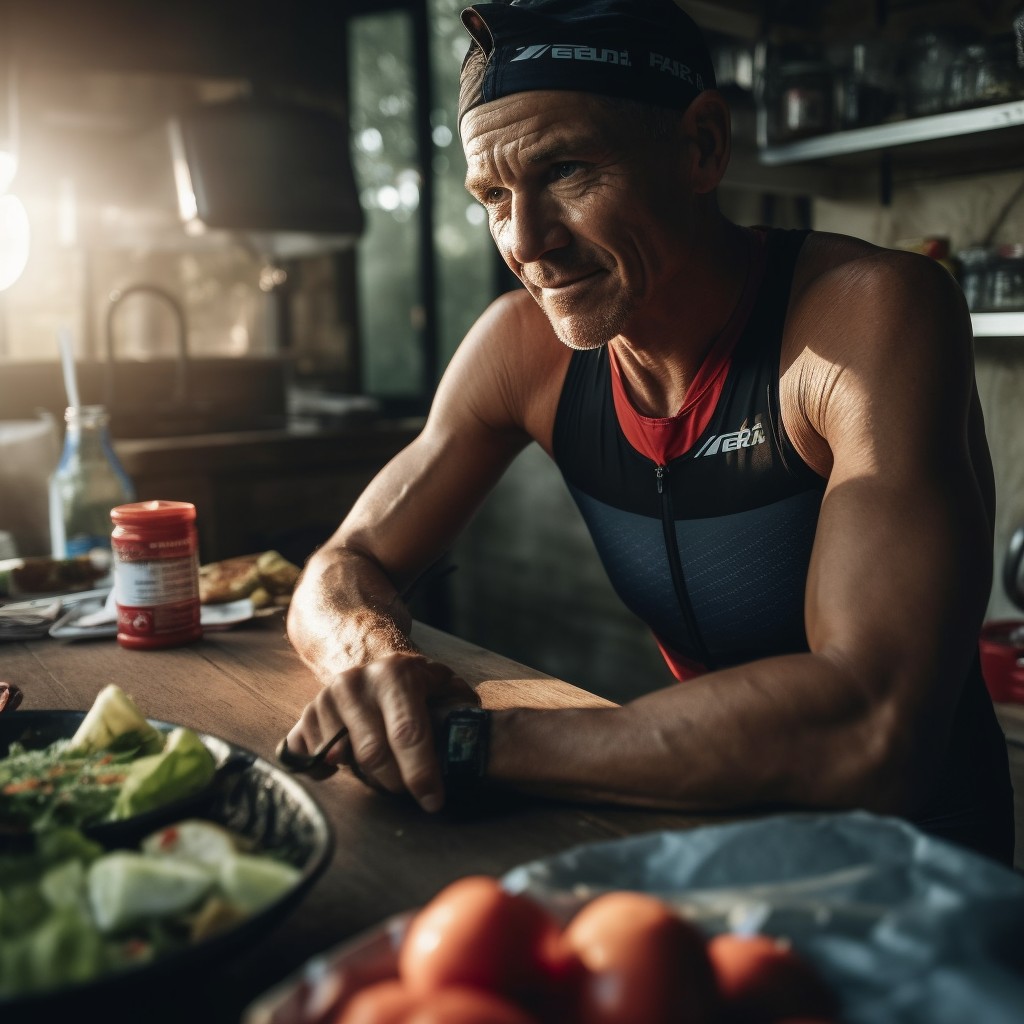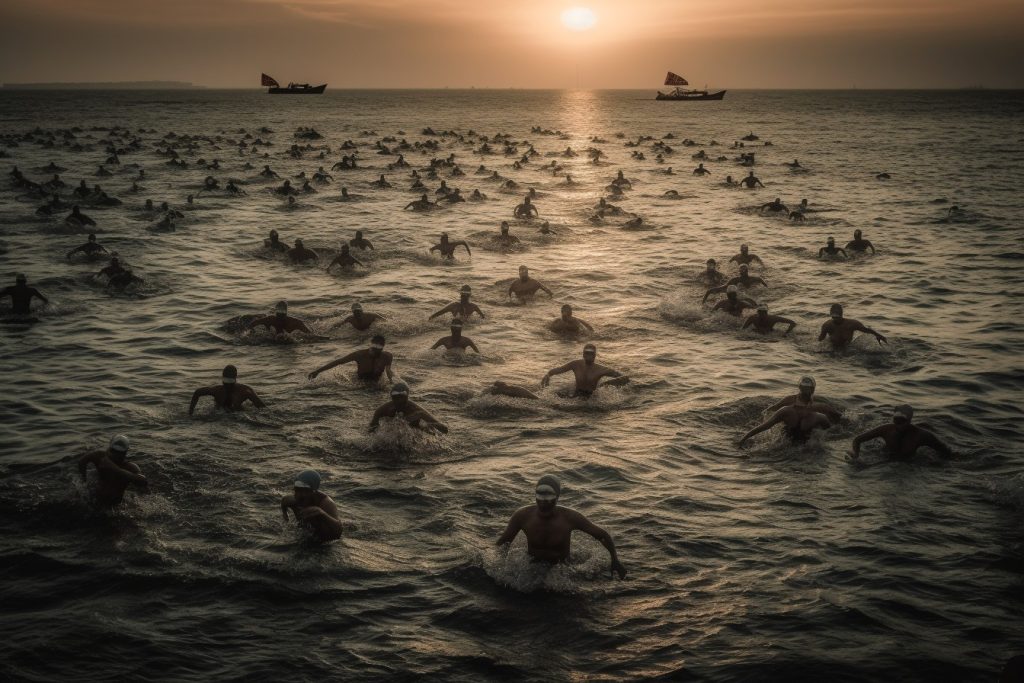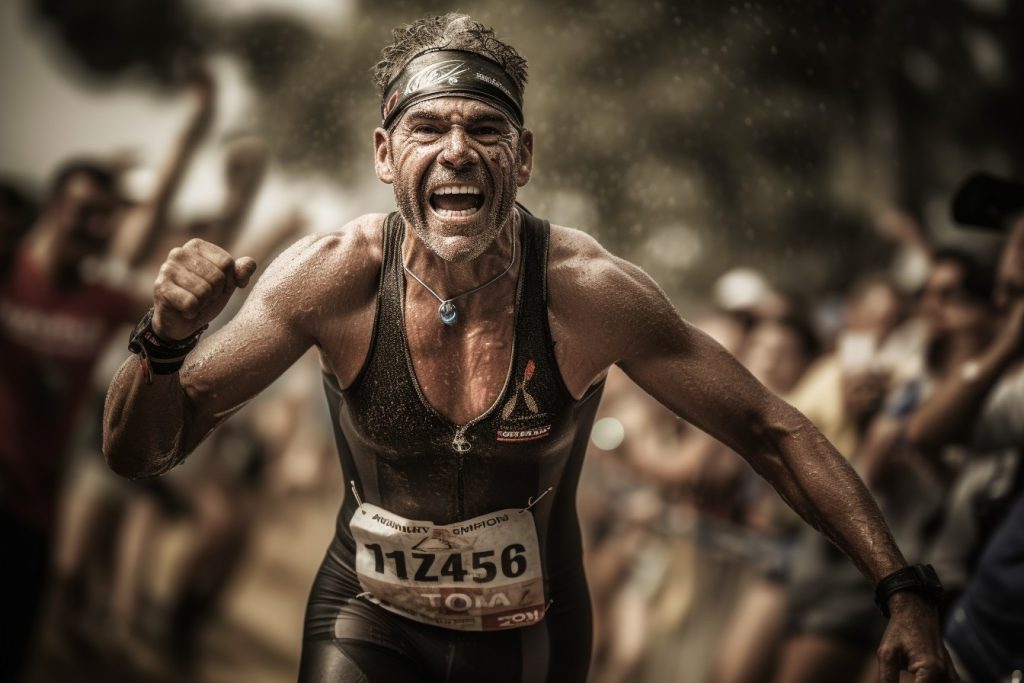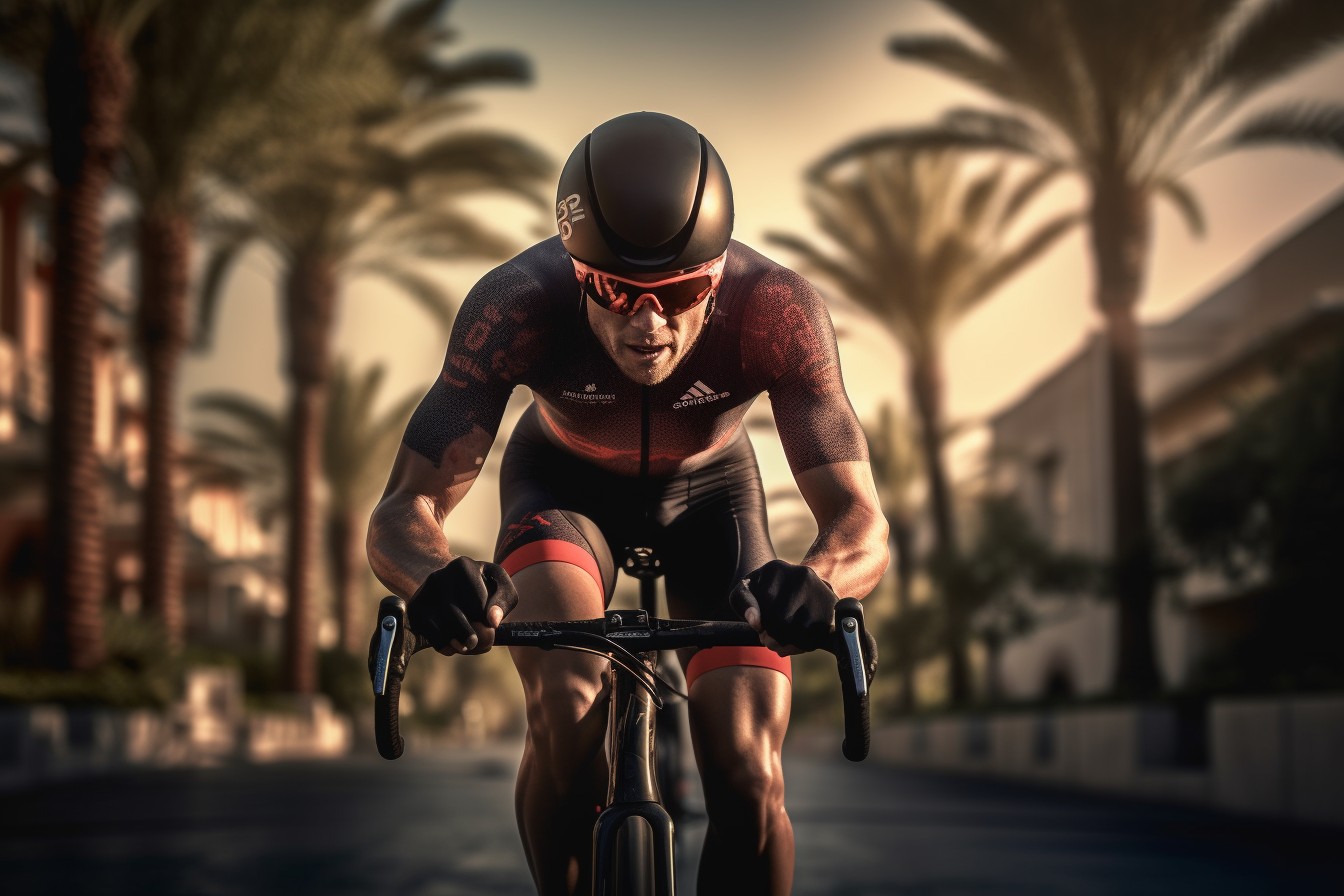Training for your first Ironman Triathlon can be a daunting task, but with the right preparation and mindset, it is achievable. In this guide, we will provide you with some tips and advice on how to train for your first Ironman Triathlon. Whether you are a seasoned athlete or a beginner, these tips will help you prepare for the race of a lifetime.
Importance of Proper Nutrition in Ironman Training

Training for an Ironman Triathlon is no easy feat. It requires months of dedication, hard work, and proper nutrition. In fact, nutrition is one of the most important aspects of Ironman training. Without proper fuel, your body won’t be able to perform at its best, and you may even risk injury or illness.
So, what does proper nutrition for Ironman training look like? First and foremost, it’s important to understand that everyone’s nutritional needs are different. What works for one person may not work for another. However, there are some general guidelines that can help you fuel your body for success.
The first thing to consider is your overall calorie intake. Ironman training requires a lot of energy, so you’ll need to make sure you’re consuming enough calories to support your workouts. This doesn’t mean you should be eating junk food all day, though. Focus on nutrient-dense foods like fruits, vegetables, whole grains, lean proteins, and healthy fats.
Carbohydrates are also an important part of an Ironman training diet. They provide your body with the energy it needs to power through long workouts. Aim to consume complex carbohydrates like sweet potatoes, brown rice, and quinoa, rather than simple carbohydrates like candy and soda.
Protein is another crucial component of an Ironman training diet. It helps repair and rebuild muscles after tough workouts. Good sources of protein include chicken, fish, tofu, beans, and lentils.
In addition to macronutrients like carbohydrates and protein, it’s important to pay attention to micronutrients like vitamins and minerals. Iron, for example, is essential for endurance athletes because it helps transport oxygen to the muscles. Good sources of iron include red meat, spinach, and lentils.
Hydration is also key when it comes to Ironman training. You’ll be sweating a lot during your workouts, so it’s important to drink plenty of water throughout the day. Aim for at least eight glasses of water per day, and more if you’re sweating heavily.
Finally, it’s important to listen to your body when it comes to nutrition. If you’re feeling sluggish or fatigued, it could be a sign that you’re not getting enough calories or nutrients. On the other hand, if you’re feeling bloated or uncomfortable, you may need to adjust your diet to include more fiber or less processed foods.
In conclusion, proper nutrition is essential for Ironman training. It’s important to consume enough calories to support your workouts, focus on nutrient-dense foods like fruits and vegetables, and pay attention to micronutrients like iron. Hydration is also key, and it’s important to listen to your body and make adjustments as needed. With the right nutrition plan in place, you’ll be well on your way to completing your first Ironman Triathlon.
Building Endurance through Consistent Training

Training for an Ironman Triathlon can be a daunting task, but with consistent training, it is achievable. Building endurance is a crucial aspect of Ironman training, and it requires a lot of dedication and hard work. Here are some tips on how to build endurance through consistent training.
Firstly, it is essential to have a training plan. A training plan will help you stay on track and ensure that you are training consistently. Your training plan should include a mix of swimming, cycling, and running, with a focus on building endurance gradually. It is important to start slowly and gradually increase the intensity and duration of your workouts.
Secondly, it is crucial to train consistently. Consistency is key when it comes to building endurance. You should aim to train at least five days a week, with a mix of long and short workouts. It is also important to listen to your body and take rest days when needed. Rest days are just as important as training days, as they allow your body to recover and prevent injury.
Thirdly, it is important to vary your workouts. Doing the same workout every day can lead to boredom and burnout. Varying your workouts will keep things interesting and challenge your body in different ways. You can mix up your workouts by doing interval training, hill repeats, or tempo runs. You can also try different types of cross-training, such as yoga or strength training, to improve your overall fitness.
Fourthly, it is important to fuel your body properly. Endurance training requires a lot of energy, so it is important to eat a balanced diet that includes plenty of carbohydrates, protein, and healthy fats. You should also stay hydrated by drinking plenty of water throughout the day and during your workouts.
Finally, it is important to stay motivated. Endurance training can be challenging, both physically and mentally. It is important to stay motivated and focused on your goals. You can stay motivated by setting realistic goals, tracking your progress, and celebrating your achievements. You can also join a training group or find a training partner to help keep you accountable and motivated.
In conclusion, building endurance through consistent training is essential for anyone training for an Ironman Triathlon. It requires dedication, hard work, and a lot of patience. By following these tips, you can build endurance and achieve your goals. Remember to have fun and enjoy the journey, as the process is just as important as the end result. Good luck!
Incorporating Strength Training into Ironman Training
Training for an Ironman triathlon is no easy feat. It requires a lot of dedication, hard work, and discipline. One of the most important aspects of Ironman training is incorporating strength training into your routine. Strength training not only helps prevent injuries but also improves your overall performance.
When it comes to strength training, it’s important to focus on the major muscle groups used in triathlon: the legs, core, and upper body. Squats, lunges, and deadlifts are great exercises for the legs, while planks, sit-ups, and Russian twists are perfect for the core. For the upper body, push-ups, pull-ups, and rows are excellent choices.
It’s important to start with lighter weights and gradually increase the weight as you get stronger. It’s also important to focus on proper form to prevent injuries. If you’re new to strength training, consider hiring a personal trainer to help you get started.
In addition to traditional strength training exercises, incorporating plyometrics into your routine can also be beneficial. Plyometrics are explosive movements that help improve power and speed. Examples of plyometric exercises include box jumps, jump squats, and burpees.
When it comes to incorporating strength training into your Ironman training, it’s important to find a balance. You don’t want to overdo it and risk injury, but you also don’t want to neglect strength training altogether. Aim to strength train 2-3 times per week, focusing on different muscle groups each session.
It’s also important to consider the timing of your strength training sessions. Ideally, you should strength train after your swim or bike workouts, as your muscles will already be warmed up. Avoid strength training the day before a long run or ride, as your muscles will need time to recover.
In addition to traditional strength training exercises, incorporating functional training into your routine can also be beneficial. Functional training focuses on movements that mimic everyday activities, such as squatting, lifting, and twisting. Examples of functional training exercises include kettlebell swings, medicine ball slams, and TRX rows.
When it comes to strength training for Ironman, it’s important to remember that it’s just one piece of the puzzle. You still need to focus on your swim, bike, and run workouts, as well as your nutrition and recovery. However, incorporating strength training into your routine can help improve your overall performance and prevent injuries.
In conclusion, incorporating strength training into your Ironman training is essential for success. Focus on the major muscle groups used in triathlon, start with lighter weights and gradually increase, and find a balance between strength training and your other workouts. Remember to focus on proper form and consider hiring a personal trainer if you’re new to strength training. With dedication and hard work, you can conquer your first Ironman triathlon.
Mental Preparation for the Ironman Triathlon

Training for an Ironman Triathlon is no easy feat. It requires months of dedication, hard work, and mental preparation. While physical training is important, mental preparation is equally crucial. In this article, we will discuss how to mentally prepare for your first Ironman Triathlon.
First and foremost, it is important to set realistic goals. You should have a clear idea of what you want to achieve and how you plan to achieve it. Setting unrealistic goals can lead to disappointment and frustration, which can negatively impact your mental state. It is important to remember that completing an Ironman Triathlon is a huge accomplishment in itself, so don’t put too much pressure on yourself.
Visualization is another important aspect of mental preparation. Visualize yourself crossing the finish line, feeling strong and accomplished. This will help you stay motivated and focused during training. You can also visualize yourself overcoming any obstacles that may arise during the race, such as fatigue or cramps.
It is also important to have a positive attitude. Believe in yourself and your abilities. Surround yourself with positive people who will support and encourage you throughout your training. Negative thoughts and self-doubt can be detrimental to your mental state, so try to stay positive and optimistic.
Another important aspect of mental preparation is developing a strong mental toughness. This can be achieved through mental exercises such as meditation, visualization, and positive self-talk. During training, you will face physical and mental challenges, and having a strong mental toughness will help you push through these challenges and stay focused on your goals.
It is also important to have a plan for race day. Visualize yourself going through each stage of the race, from the swim to the bike to the run. Have a plan for how you will handle any unexpected situations that may arise, such as bad weather or equipment malfunctions. Having a plan will help you stay calm and focused on race day.
Finally, it is important to remember why you are doing this. Whether it is to challenge yourself, raise money for a charity, or simply to prove to yourself that you can do it, keep your motivation in mind throughout your training. This will help you stay focused and committed to your goals.
In conclusion, mental preparation is just as important as physical training when it comes to preparing for your first Ironman Triathlon. Set realistic goals, visualize success, maintain a positive attitude, develop mental toughness, have a plan for race day, and remember why you are doing this. With these tips, you will be mentally prepared to tackle the challenges of an Ironman Triathlon and cross the finish line feeling strong and accomplished.
Tips for Balancing Work, Life, and Ironman Training
Training for an Ironman Triathlon is no easy feat. It requires a lot of dedication, hard work, and time management skills. Balancing work, life, and Ironman training can be a challenge, but it is possible. Here are some tips to help you train for your first Ironman Triathlon while still maintaining a healthy work-life balance.
First and foremost, it is important to have a plan. You need to set realistic goals and create a training schedule that works for you. This means taking into account your work schedule, family commitments, and other obligations. You may need to wake up earlier or stay up later to fit in your training sessions, but it is important to make sure you are getting enough rest and not sacrificing your health.
Another important aspect of balancing work, life, and Ironman training is to prioritize your time. This means making sure that you are focusing on the most important tasks first. For example, if you have a big project due at work, you may need to adjust your training schedule to make sure you have enough time to complete the project. On the other hand, if you have a family event or obligation, you may need to adjust your training schedule to make sure you are there for your loved ones.
It is also important to be flexible. Life happens, and sometimes things don’t go according to plan. You may need to adjust your training schedule or miss a session due to unforeseen circumstances. Don’t beat yourself up over it. Just get back on track as soon as possible and keep moving forward.
One way to make sure you are staying on track with your training is to find a training partner or group. This can help keep you accountable and motivated. Plus, it can be a lot more fun to train with others who share your passion for triathlons.
Another important aspect of balancing work, life, and Ironman training is to take care of yourself. This means getting enough sleep, eating a healthy diet, and taking time to relax and recharge. It can be easy to get caught up in the training and forget about your own needs, but this can lead to burnout and injury. Make sure you are taking care of yourself both physically and mentally.
Finally, it is important to remember why you are doing this. Training for an Ironman Triathlon is a huge accomplishment, but it is also a journey. Enjoy the process and celebrate your progress along the way. Remember that you are doing this for yourself and no one else. Keep your goals in mind and stay focused on what you want to achieve.
In conclusion, balancing work, life, and Ironman training can be a challenge, but it is possible. With a plan, prioritization, flexibility, support, self-care, and a clear focus on your goals, you can train for your first Ironman Triathlon while still maintaining a healthy work-life balance. Remember to enjoy the journey and celebrate your progress along the way. Good luck!

Conclusion
To train for your first Ironman Triathlon, it is important to have a structured training plan that includes a balance of swimming, cycling, and running. Gradually increase your training volume and intensity over time, while also incorporating strength training and recovery days. It is also important to focus on nutrition and hydration, as well as mental preparation and goal setting. With dedication and consistency, anyone can successfully complete an Ironman Triathlon.


Leave a Reply